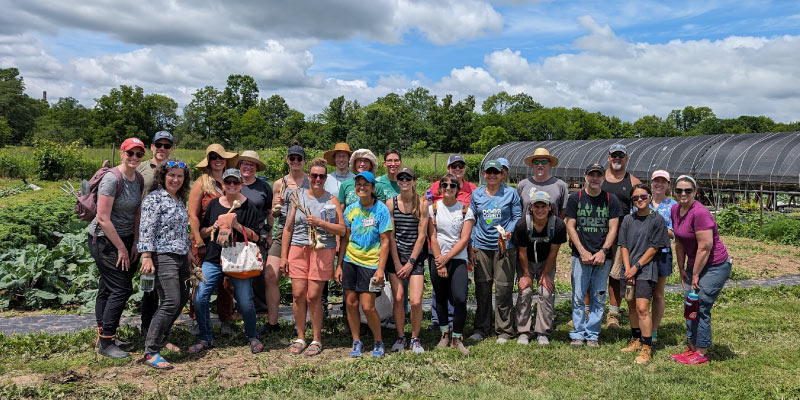
The forecast had predicted rain, but blue skies prevailed as two dozen Nelson Institute staff members tromped through the paths at Troy Community Gardens, snacking on wild blackcap raspberries along the way. The group was headed toward the treeline on the north end of the garden, beyond which sits rows of organic cabbage, sweet potatoes, and more. This is Troy Farm, and it’s one of Madison’s oldest urban farms.
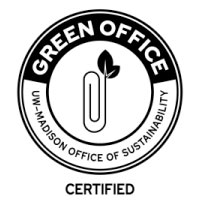 For being located just off the bustling Northport Drive on Madison’s north side, the farm is a surprisingly serene — and large — setting (the triangle-shaped plot of land could fit nearly 10 Science Halls). Paul Huber, the farm’s director, leads the group of Nelson staff members to a tool shed. The team is here for a volunteer work day, so as Huber doles out work gloves, metal rakes, and weeding tools, he gives an overview of the farm and its mission.
For being located just off the bustling Northport Drive on Madison’s north side, the farm is a surprisingly serene — and large — setting (the triangle-shaped plot of land could fit nearly 10 Science Halls). Paul Huber, the farm’s director, leads the group of Nelson staff members to a tool shed. The team is here for a volunteer work day, so as Huber doles out work gloves, metal rakes, and weeding tools, he gives an overview of the farm and its mission.
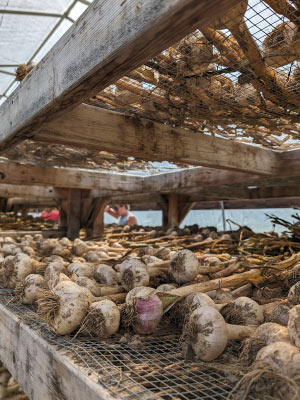
Troy Farm is one of two urban farms and three community gardens that make up Rooted, a local nonprofit that helps create healthy, equitable, and sustainable neighborhoods through food, land, and learning. Anyone can volunteer at the farm, and the certified organic produce that’s harvested goes right back to the community, he explains. The shed is located behind an impressive solar array, which provides all of the farm’s electrical needs (any surplus goes back to the city’s grid).
If this all feels very green, so is the Nelson staff’s reason for being there. In May, the Nelson Institute’s administrative offices in Science Hall received certification through the Office of Sustainability’s (OS)’s Green Office Certification. Now, they’re working toward achieving a platinum-level designation.
“It was a great morning of sunshine, camaraderie — and lots and lots of garlic!”
— Emily Reynolds
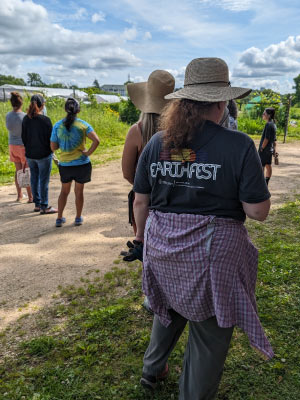
The Green Offices program began in 2017 as one of the OS’s efforts to help the UW–Madison campus move toward a more sustainable future. In the program’s first year, five offices were recognized (the Nelson Institute among them). Today, 16 offices are certified and an additional 10 offices hold platinum status.
Nelson’s certification process started in November 2023, when business manager Robin Higgins reached out to the Green Office intern team. The interns met with Nelson representatives in March, which was followed by a checklist for the office to complete in order to earn its status. Among the to-dos were setting printers to print double-sided, using switch-activated power strips, and having clearly marked landfill and recycling bins.
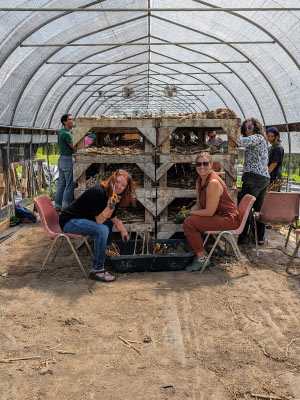
Right after receiving its Green Office designation, the Nelson team started the next steps toward a platinum designation. First, OS interns conducted waste and energy audits of the offices, complete with recommendations for areas of improvement. “Your office does a very good job at being energy efficient and energy conscious,” the energy audit noted. “Many offices had devices and appliances unplugged when they were not in use. This is a great habit to encourage!”
The third and final step for the Nelson Institute to go platinum was to have 50 percent of its staff volunteer with a community organization. That’s what brought the Nelson team out to Troy Farm for a day spent weeding and harvesting garlic. “The Nelson Institute has had a long relationship with Rooted, with our students volunteering there and alumni working there. This felt like a natural fit and opportunity for the Nelson staff to give back to an organization that has long supported student experiential learning,” says Emily Reynolds, the Nelson Institute’s director of community engagement and alumni relations. “It was a great morning of sunshine, camaraderie — and lots and lots of garlic!”